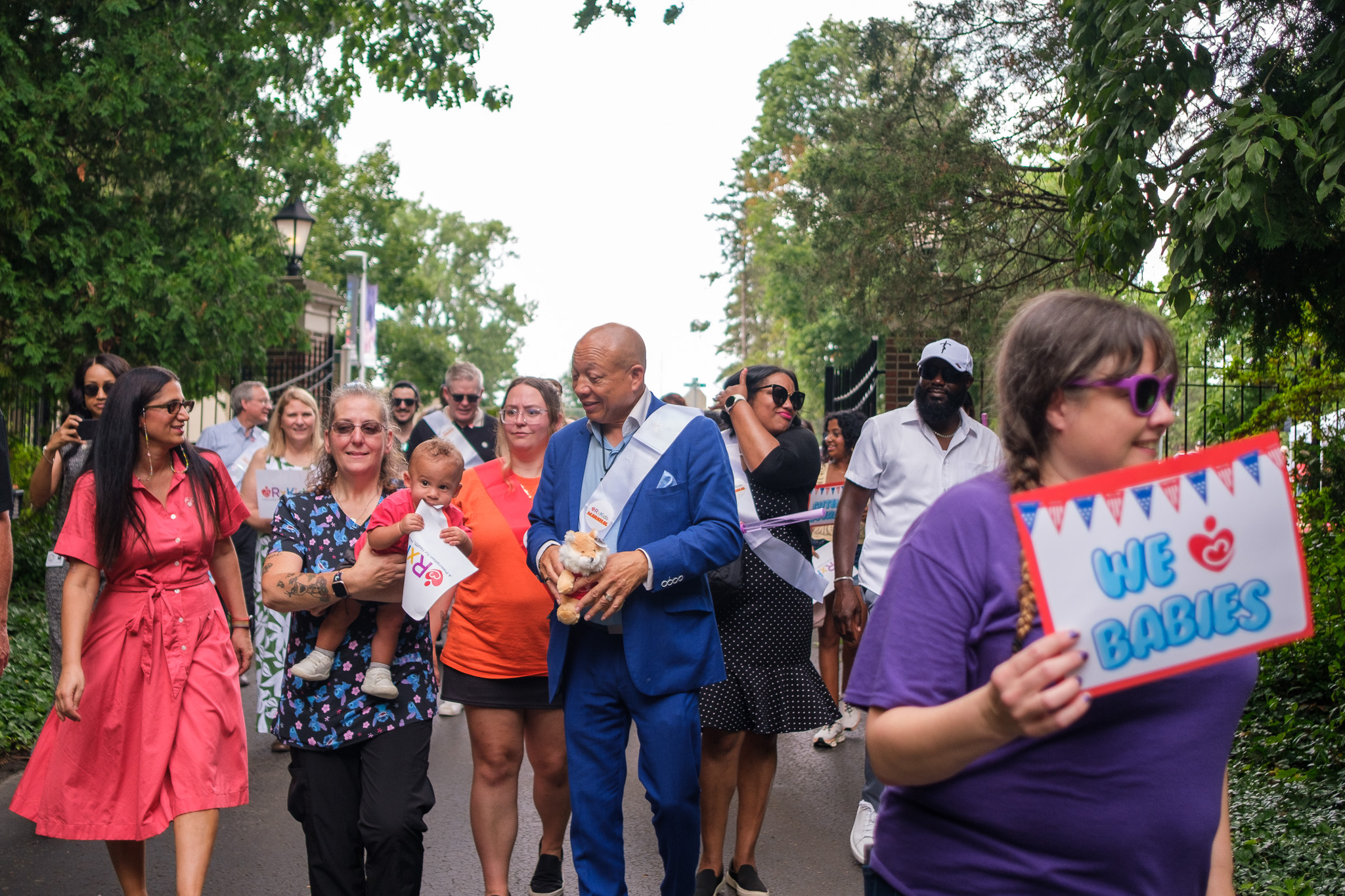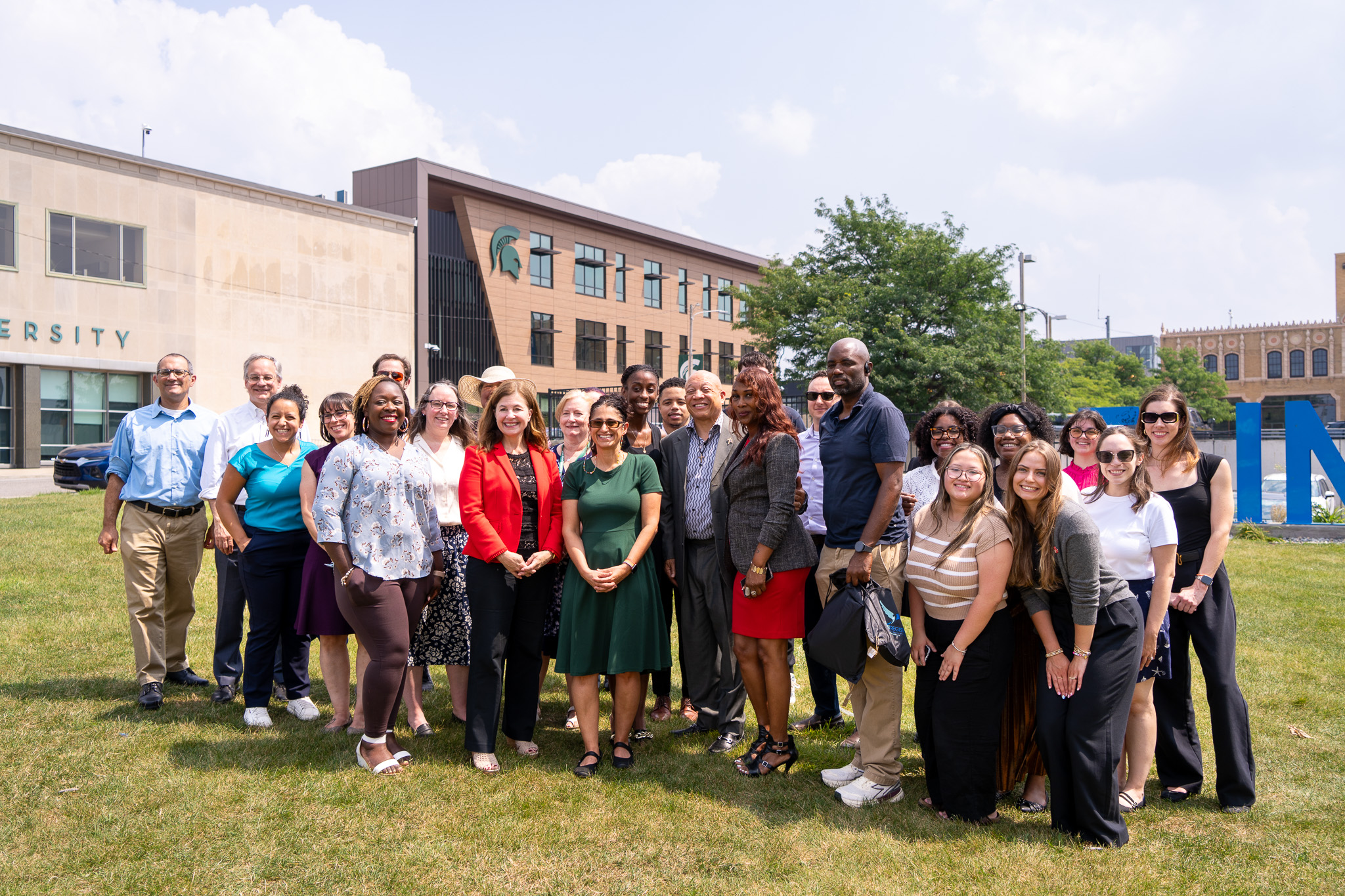If you want to know what raising a family might look like under a Kamala Harris presidency, look to this Rust Belt city.
For years, Flint has been something of a cautionary tale. A decade ago, lead in the water supply poisoned the city’s children. As of last year, it still had one of the highest child poverty rates in the nation.
But Flint aims to reinvent itself with an innovative, pro-family program that has become a key plank of Harris’s economic agenda: giving newborn babies $6,000 in cash, no strings attached.
In Flint’s pilot (and Harris’s national iteration), families are entrusted to use this windfall however they see fit. Every family’s needs are different, after all, even if nearly all face the same financial challenge: When a baby arrives, household earnings usually plummet. But the kid still requires all those dang bottles, diapers, pumps, cans of formula, wipes, cribs, onesies, strollers, car seats and more.
“Babies are expensive,” summarizes Mona Hanna, co-founder of Flint’s Rx Kids program.
Hanna (known to locals as just “Dr. Mona”) is the relentlessly upbeat, baby-obsessed public health advocate and Michigan State University professor whose research exposed the Flint water crisis. She’s also a practicing pediatrician. Over the years, she has grown frustrated by how little she can improve the health of her tiniest patients, who often cope with inadequate nutrition, unstable housing and stressed parents.
“I know how to take care of kids, I know what kids need, but I don’t know how to get them the cash to do it,” she said. “For so long, I just wanted to have something in my doctor’s bag to prescribe away poverty.”
She found a way to do it. Rx Kids is so named because it “prescribes” cash for babies and pregnant moms. Since January, city residents have been eligible for $1,500 at 20 weeks’ gestation and then $500 for each of the 12 months after birth (so $6,000 total for a baby’s first year). There are no income tests, making the program cheaper to administer and perhaps less stigmatized.
Of course, Flint is also very low income, so there probably aren’t many millionaires claiming a baby bonus.
So far, about 1,000 families (including 98 percent of all babies born in Flint) have received money. Cash is administered through debit cards or direct deposits, managed by the nonprofit GiveDirectly. Having secured $91 million through a combination of federal, state and private funds, Rx Kids will launch programs next year in several other low-income communities across Michigan. The state’s Democratic governor, Gretchen Whitmer, is keen to expand it.
So, it turns out, is our vice president.
Hanna gave a presentation about Rx Kids at the White House this year, and staff fell in love with it. A version of the program made its way into Harris’s presidential platform: offering every family with a newborn $6,000 as a refundable child tax credit, available in monthly installments. At campaign stops around the country, Harris has marketed this promise as a centerpiece of her agenda to reduce the cost of living. (Unlike Rx Kids, Harris’s proposal doesn’t include the $1,500 prenatal cash grant. She has, however, pledged to revive the pandemic-era expanded child tax credit for older kids.)
Harris’s overall child tax credit expansion would cost about $1 trillion over a decade. What might that investment buy us? In addition to all the existing research on child allowances, Rx Kids offers some instructive takeaways.
Hanna, in partnership with University of Michigan professor H. Luke Shaefer, has been using surveys and administrative records to track outcomes for families in the Flint pilot. The researchers compare results with several control groups, including demographically similar families outside the city and prior cohorts of Flint moms and babies. The program is less than a year old, but early results are promising.
So far, enrolled families show less smoking in the third trimester and fewer babies born with very low birthweight. They also report less food and housing insecurity. In fact, there have been zero evictions in the treated population (vs. 2 to 8 percent in the control groups).
One mother I met at an Rx Kids Halloween-themed event said she used the cash to stabilize her housing situation. Mary Green, 43, is in recovery from substance abuse and had relapsed shortly before learning she was pregnant with baby Lynx late last year. She was devastated when she found out. She heard about Rx Kids from a nun who works at a local Catholic community organization.
“I didn’t have hope for anything and no money,” Green recounts. She said she was initially concerned that the free cash might be some sort of scam but ultimately decided to enroll because she trusted the source of her information. Green said the cash gave her financial space to break up with her baby’s father (who she said was still using), leave shelter housing and move out on her own.
“I had followed him down the hole, you know?” said Green of her baby’s father. She had previously lost custody of her older kids and has now resolved to get them back. “The money gave me more room. More faith.”
That “faith” part appears to be a common sentiment. Relative to the control groups, parents in Rx Kids also report higher levels of more subjective measures, such as feeling “loved” and “valued” and having “hope.”
Hanna acknowledges it’s hard disentangle whether these improvements are because of the cash itself or other factors. Parents are not required to participate in any other social or parenting programs as a condition of receiving the money. But many do; in fact, enrollees received more prenatal care and at earlier stages of pregnancy than parents in the control groups. That might be because they learn about other available support services when joining Rx Kids. “Free money” advertises itself and can get people in the door who might not otherwise apply for other programs.
It might also soften the (reasonable) distrust some people harbor toward local services. Which is part of the point, Hanna says.
“We are trying to rebuild the social contract, rebuilding trust in government and health-care institutions,” Hanna says. “We are trying to show families that they are loved and valued.”
That’s a common theme in Flint lately. This summer, the city commissioned an enormous mural of happy kids, inspired by a 1918 poster honoring President Woodrow Wilson’s “Children’s Year.” (“The health of the child is the power of the nation,” read both the 1918 and 2024 versions.) And in June, the town hosted a “baby parade.”
A federal infant-cash-aid program administered through the tax code probably wouldn’t feel as warm and fuzzy; it’s hard to imagine the Internal Revenue Service swaddling new families with Halloween parties and baby parades. But for lower- and middle-income families struggling with their new, expensive bundle of joy, the money would still be more than welcome. Flint leaders and families are proud of the prospect of serving as a model for an innovative national pro-family policy, rather than the poster child for failed government.
“For a long time, we have not wanted to be remembered as the city that poisons its kids,” Hanna says. “We want to be remembered for what we do next.”
Get the latest updates on our programs and initiatives.


